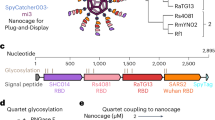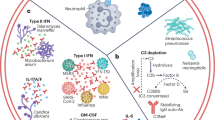Abstract
A mouse model of chronic Pseudomonas-induced bronchopulmonary inflammation that mimics chronic cystic fibrosis (CF) lung disease was employed to determine whether this inflammatory milieu influences immune responses to adenoviral vectors. Pseudomonas-infected and control mice were inoculated intranasally with a second-generation type 2 adenovirus (Ad2) vector (Ad2/βgal-2). After 3 weeks, serum and airway Ad2-specific antibodies and Ad2 vector-directed, cytotoxic T-lymphocyte (CTL) activity in splenocytes were measured. No differences in humoral immunity were observed between Pseudomonas-infected mice and controls. However, there was a two- to three-fold increase in Ad-specific CTL activity in the Pseudomonas-infected mice compared to control mice. MHC class I-dependent antigen presentation by antigen-presenting cells (APC) from lungs of Pseudomonas-infected mice was also significantly increased compared to APC from control mice, suggesting a mechanism that may contribute to increased Ad-specific CD8+ CTL responses. It was concluded that Ad-specific CTL activity is enhanced in the setting of pre-existing chronic Pseudomonas-induced lung inflammation similar to CF lung disease, and that increased antigen presentation via MHC class I in this setting may be one underlying mechanism. These findings underscore the importance of considering the influence of the disease milieu when evaluating modes of gene therapy for such diseases in animal models.
This is a preview of subscription content, access via your institution
Access options
Subscribe to this journal
Receive 12 print issues and online access
$259.00 per year
only $21.58 per issue
Buy this article
- Purchase on Springer Link
- Instant access to full article PDF
Prices may be subject to local taxes which are calculated during checkout





Similar content being viewed by others
References
Khan T et al. Early pulmonary inflammation in infants with cystic fibrosis. Am J Respir Crit Care Med 1995; 151: 1075–1082.
Konstan M, Berger M . Infection and inflammation of the lung in cystic fibrosis. In: Davis P (ed) Cystic Fibrosis. Marcel Dekker: New York, 1993, pp 219–276.
Caplen N et al. Liposome-mediated CFTR gene transfer to the nasal epithelium of patients with cystic fibrosis. Nat Med 1995; 1: 39–46.
Engelhardt J et al. Adenovirus-mediated transfer of the CFTR gene to lung of nonhuman primates: biological efficacy study. Hum Gene Ther 1993; 4: 759–769.
Engelhardt J et al. Direct gene transfer of human CFTR into human bronchial epithelia of xenografts with E1-deleted adenoviruses. Nat Genet 1993; 4: 27–34.
Ferkol T, Kaetzel CS, Davis PB . Gene transfer into respiratory epithelial cells by targeting the polymeric immunoglobulin receptor. J Clin Invest 1993; 93: 2394–2400.
Flotte T et al. Stable in vivo expression of the cystic fibrosis transmembrane conductance regulator with an adeno-associated virus vector. Proc Natl Acad Sci USA 1993; 90: 10613–10617.
Grubb BR et al. Inefficient gene transfer by adenovirus vector to cystic fibrosis airway epithelia of mice and humans. Nature 1994; 371: 802–806.
Mastrangeli A et al. Diversity of airway epithelial cell targets for in vivo recombinant adenovirus-mediated gene transfer. J Clin Invest 1993; 91: 225–234.
Zabner J et al. Adenovirus-mediated gene transfer transiently corrects the chloride transport defect in nasal epithelia of patients with cystic fibrosis. Cell 1993; 75: 207–216.
Wickham TJ . Targeting adenoviruses. Gene Therapy 2000; 7: 110–114.
Driskell RA, Engelhardt JF . Current status of gene therapy for inherited lung diseases. Annu Rev Physiol 2003; 65: 585–612.
Yei S et al. Adenovirus-mediated gene transfer for cystic fibrosis: quantitative evaluation of repeated in vivo vector administration in the lung. Gene Therapy 1994; 1: 192–200.
Zabner J et al. Safety and efficacy of repetitive adenovirus-mediated transfer of CFTR cDNA to airway epithelia of primates and cotton rats. Nat Genet 1994; 6: 75–83.
Kaplan J et al. Characterization of factors involved in modulating persistence of transgene expression from recombinant adenovirus in the mouse lung. Hum Gene Ther 1997; 8: 45–56.
Yang Y, Li Q, Ertl H, Wilson J . Cellular and humoral immune responses to viral antigens create barriers to lung-directed gene therapy with recombinant adenoviruses. J Virol 1995; 69: 2004–2015.
van Heeckeren A, Ferkol T, Tosi M . Effects of bronchopulmonary inflammation induced by Pseudomonas aeruginosa on adenovirus-mediated gene transfer to airway epithelial cells in mice. Gene Therapy 1998; 5: 345–351.
Bonfield T et al. Inflammatory cytokines in cystic fibrosis lungs. Am J Respir Crit Care Med 1995; 152: 2111–2118.
Yang Y et al. Cellular immunity to viral antigens limits E-1-deleted adenoviruses for gene therapy. Proc Natl Acad Sci USA 1994; 91: 4407–4411.
Kaplan JM, Smith AE . Transient immunosuppression with deoxyspergualin improves longevity of transgene expression and ability to readminister adenoviral vector to the mouse lung. Hum Gene Ther 1997; 8: 1095–1104.
Kay M et al. Long-term hepatic adenovirus-mediated gene expression in mice following CTLA4Ig administration. Nat Genet 1995; 11: 191–197.
Scaria A et al. Antibody to CD40 ligand inhibits both humoral and cellular immune responses to adenoviral vectors and facilitates repeated administration to mouse airway. Gene Therapy 1997; 4: 611–617.
Morral N et al. Administration of helper-dependent adenoviral vectors and sequential delivery of different vector serotype for long-term liver-directed gene transfer in baboons. Proc Natl Acad Sci USA 1999; 96: 12816–12821.
Scaria A et al. Adenoviral vector expressing ICP47 inhibits adenovirus-specific cytotoxic T lymphocytes in non-human primates. Mol Ther 2000; 2: 505–514.
Fick RB, Naegel GP, Matthay RA, Reynolds HY . Cystic fibrosis Pseudomonas opsonins: inhibitory nature in an in vitro phagocytic assay. J Clin Invest 1981; 68: 899–914.
Thomassen MJ et al. Inhibitory effect of cystic fibrosis serum on Pseudomonas phagocytosis by rabbit and human alveolar macrophages. Pediatr Res 1979; 13: 1085–1088.
Tosi M et al. Cross-sectional and longitudinal studies of naturally occurring antibodies to Pseudomonas aeruginosa in cystic fibrosis indicate absence of antibody-mediated protection and decline in opsonic quality after infection. J Infect Dis 1995; 172: 453–461.
Bilyk N, Holt PG . Cytokine modulation of the immunosuppressive phenotype of pulmonary alveolar macrophage populations. Immunology 1995; 86: 231–237.
McCormack JM, Askew D, Walker WS . Alloantigen presentation by individual clones of mouse splenic macrophages. J Immunol 1993; 151: 5218–5227.
Morral N et al. Immune responses to reporter proteins and high viral dose limit duration of expression with adenoviral vectors: comparison of E2a wild-type and E2a-deleted vectors. Hum Gen Ther 1997; 8: 1275–1286.
Tripathy SK, Black HB, Goldwasser E, Leiden JM . Immune responses to transgene-encoded proteins limit the stability of gene expression after injection of replication-defective adenovirus. Nat Med 1996; 2: 545–550.
van Heeckeren A et al. Excessive inflammatory response of cystic fibrosis mice to bronchopulmonary infection with Pseudomonas aeruginosa. J Clin Invest 1997; 100: 2810–2815.
Starke JR, Edwards MS, Langston C, Baker CJ . A mouse model of chronic pulmonary infection with Pseudomonas aeruginosa and Pseudomonas cepacia. Pediatr Res 1987; 22: 698–702.
Cash HA et al. A rat model of chronic respiratory infection with Pseudomonas aeruginosa. Am Rev Resp Dis 1979; 119: 453–459.
Harding C et al. Novel dipeptide aldehydes are proteasome inhibitors and block the MHC class I antigen processing pathway. J Immunol 1995; 155: 1767–1775.
Ahmed SA, Gogal, Jr RM, Walsh JE . A new rapid, and simple non-radioactive assay to monitor and determine the proliferation of lymphocytes: an alternative to 3H-thymidine incorporation assays. J Immunol Methods 1994; 170: 211–224.
Acknowledgements
We thank Harriet Zakem-Cloud for expert technical assistance and Dr Pamela Davis for invaluable advice and support. This work was supported by Public Health Service grant DK48996 and by grants from the Cystic Fibrosis Foundation.
Author information
Authors and Affiliations
Rights and permissions
About this article
Cite this article
Tosi, M., van Heeckeren, A., Ferkol, T. et al. Effect of Pseudomonas-induced chronic lung inflammation on specific cytotoxic T-cell responses to adenoviral vectors in mice. Gene Ther 11, 1427–1433 (2004). https://doi.org/10.1038/sj.gt.3302290
Received:
Accepted:
Published:
Issue Date:
DOI: https://doi.org/10.1038/sj.gt.3302290
Keywords
This article is cited by
-
Progress and prospects: gene therapy for genetic diseases with helper-dependent adenoviral vectors
Gene Therapy (2008)
-
Lentiviral transduction of the murine lung provides efficient pseudotype and developmental stage-dependent cell-specific transgene expression
Gene Therapy (2008)
-
Gene therapy progress and prospects: cystic fibrosis
Gene Therapy (2006)



